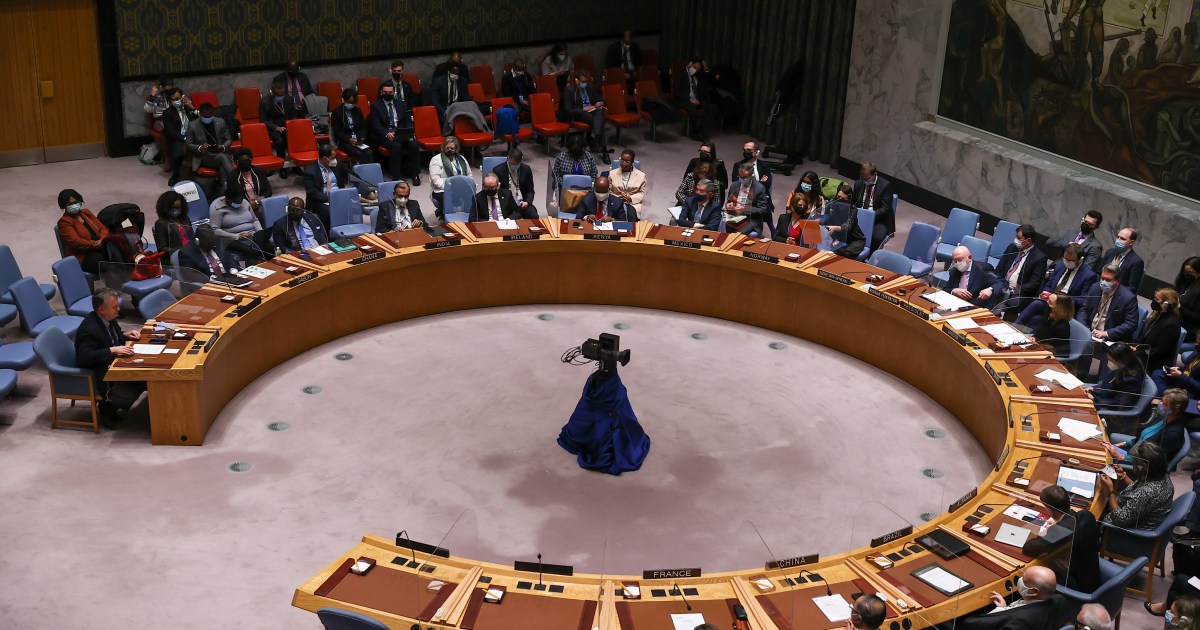Agence France-Presse quoted a Western diplomat as saying that Western countries were "very disappointed by the UAE's abstention from voting twice, last Friday and Sunday, during the vote on Security Council resolutions related to the war in Ukraine."
The diplomatic source - who spoke on condition of anonymity - added that the goal of this position "was to avoid Russia's use of the veto", on Monday, during the adoption of the resolution extending the arms embargo imposed on the Houthi group in Yemen.
For his part, a European diplomat told the same agency - who asked not to be identified - "We are very upset with the UAE and are convinced that it made a dirty deal with Russia," linked to the Houthis and Ukraine.
The agency quoted another diplomatic source as saying that the UAE's abstention from voting at the United Nations is linked to a desire to preserve the possibilities of "dialogue" to find a peaceful solution to the crisis, stressing that the UAE is very concerned about the "humanitarian consequences" of the conflict.
On Monday, the UN Security Council, with the support of the UAE, issued a resolution extending the ban on the delivery of weapons to Yemen to include all Houthi militants, after it was limited to specific individuals and companies.
The resolution - in which 11 countries voted in favor while 4 abstained, namely Norway, Mexico, Brazil and Ireland - considered the Houthis a "terrorist group", for the first time.
Diplomats interpreted Russia's vote, which is close to Iran and supports the Houthis, in favor of the resolution as the result of an "agreement" between Moscow and Abu Dhabi, through which Moscow aimed to ensure that the UAE abstained from voting in the Security Council against the Russian war on Ukraine last Thursday.
The UAE abstained from voting on the resolution that was met with a Russian veto, along with India and China, and explained its decision as stemming from its desire not to support any party to the conflict, calling for a diplomatic solution.
The resolution, drafted by the United Kingdom and extending the arms embargo until February 28, 2023, states that the "entity" specified in its annexes, the Houthis, "will be subject to procedures related to the arms embargo" imposed on Yemen since 2015.
And the UAE mission to the United Nations considered - in a tweet on Twitter - that the decision "will limit the military capabilities of the Houthis, push towards stopping their escalation in Yemen and the region, and will prevent their hostile activities against civilian ships and threats to shipping lines and international trade."
According to a diplomatic source, extending the scope of the ban is important on the political level, but it will not change much in practical terms for the Houthi militants who control large areas in Yemen, including the capital, Sanaa.
The UAE has recently been subjected to attacks by the Houthis with ballistic missiles and drones, which the UAE air defenses managed to shoot down, but the first attack killed 3 people in the capital, Abu Dhabi.
Resolution 2140 "strongly condemns the cross-border attacks by the Houthi terrorist group, including attacks on Saudi Arabia and the United Arab Emirates, and the targeting of civilians and civilian infrastructure, and demands an immediate cessation of such attacks."
Like other Gulf countries, the UAE maintains important security, economic, and military relations with Washington, but the growing ties with Moscow are forcing these countries to seek a difficult balance in their positions.
The Emirates, especially Dubai, has long been seen as a magnet for Russian investment and a vacation destination for Russian elites.
As a major player in energy markets, all the Gulf Cooperation Council countries maintain a relationship with Russia in the field of energy, while Riyadh and Moscow have for years led the "OPEC Plus" alliance, where they control production together to achieve stability in the price market.
And last Sunday, Adviser to the UAE President for Diplomatic Affairs, Anwar Gargash, explained - in a tweet - that "the UAE's position is firm towards the basic principles of the United Nations, international law, state sovereignty, and the rejection of military solutions."
"We believe that alignment and positioning will only lead to more violence, and in the Ukrainian crisis, our priorities are to encourage all parties to adopt diplomacy and negotiate to find a political settlement that ends this crisis," he said.

